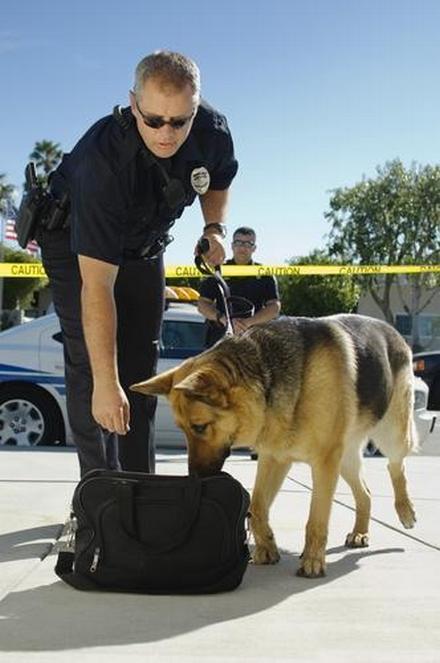TELEPHONES ANSWERED 24 HOURS A DAY
Drug-Sniffing Dogs around Your Home
 The debate over drug detection dogs or drug-sniffing dogs has taken on life in recent months and years on several different fronts. There have been many concerns raised over the training methods used with such animals and the reliability of results that they produce. While the accuracy of drug-sniffing dogs is certainly a reasonable issue to discuss, more and more questions are being asked regarding the legality and constitutionality of using the dogs. Citizens are often left wondering if the employment of drug-sniffing dogs in certain situations constitutes a violation of Fourth Amendment Rights.
The debate over drug detection dogs or drug-sniffing dogs has taken on life in recent months and years on several different fronts. There have been many concerns raised over the training methods used with such animals and the reliability of results that they produce. While the accuracy of drug-sniffing dogs is certainly a reasonable issue to discuss, more and more questions are being asked regarding the legality and constitutionality of using the dogs. Citizens are often left wondering if the employment of drug-sniffing dogs in certain situations constitutes a violation of Fourth Amendment Rights.
Florida v. Jardines
According to the United State Supreme Court, citizens may be justified in such concerns, and, in fact, ruled that a private home is protected from searches and investigations from police, including drug-sniffing dogs, without a warrant. The 2013 ruling on Florida v. Jardines, addressed a situation that occurred back in 2006, when police brought a drug-sniffing dog to a Miami man’s front porch, where the dog alerted law enforcement that he detected illegal drugs. Using the dog’s alert as probable cause, police obtained a warrant, searched the home, and found evidence of marijuana trafficking.
The trial court suppressed the evidence found in the search, holding that the warrant had violated the man’s Fourth Amendment protections against unlawful search and seizure. The initial sniff by the dog constituted an illegal search and was used as the basis for the warrant, leading to all of the evidence to be considered unlawfully obtained.
A Florida appeals court reversed the trial court’s decision, based on the officer’s right to approach the front door like any other private citizen. The Florida Supreme Court reversed the appellate court’s decision, essentially agreeing with the trial court that, while the officer can reasonably be on a person’s porch, the dog’s sniff constituted a substantial government intrusion.
U.S. Supreme Court Ruling
The United States Supreme Court affirmed the Florida high court’s ruling 5-4, with Justice Antonin Scalia writing the majority opinion. His opinion maintained that any visitor to a home has the implied permission of the resident to “approach the home by the front path, knock promptly, wait briefly to be received, and then (absent invitation to linger longer) leave.” Justice Scalia continued that it does not take comprehensive legal training to understand this concept and that “it is generally managed without incident by the Nation’s Girl Scouts and trick-or-treaters.”
However, the introduction of a drug-sniffing dog to investigate the area around the home looking for evidence is different, and there is no implicit permission or invitation for law enforcement to do that. Scalia compared the situation to a homeowner finding a visitor on his lawn with a metal detector; most residents would be inclined to call the police, not assume the visitor had the right to be there.
Legal Help Protecting Your Rights
The use of drug-sniffing dogs is not likely to end anytime soon, but as evidenced the Supreme Court’s ruling, their application is becoming more limited. If you have been charged with any drug-related crime based on evidence found as a result of an improper dog sniff, contact an experienced Chicago criminal defense attorney. We will review your case and fight diligently to protect your rights. Call today to schedule a free initial consultation.




